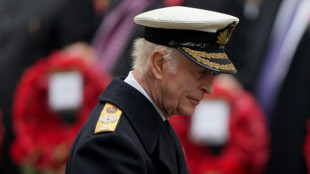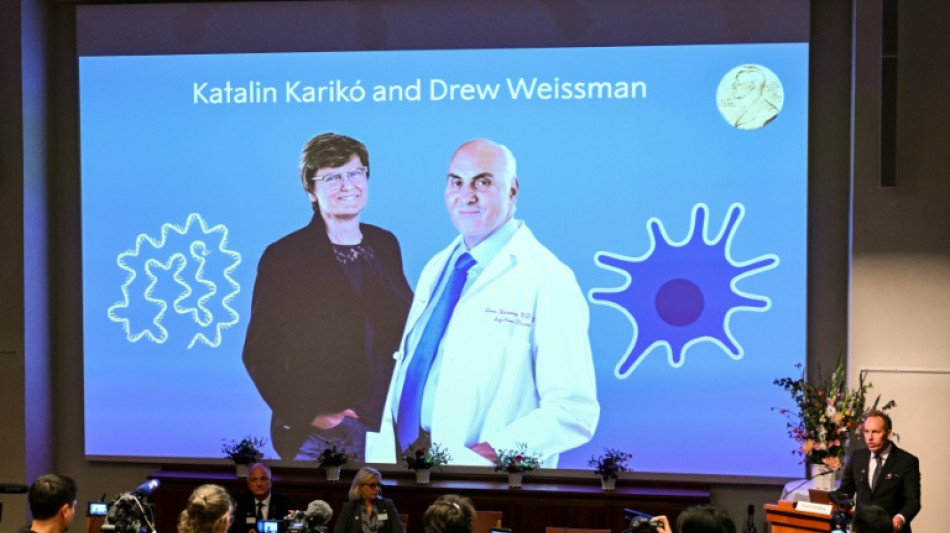
-
 Van Nistelrooy says he will 'cherish' Man Utd memories in farewell message
Van Nistelrooy says he will 'cherish' Man Utd memories in farewell message
-
IAEA chief tours sensitive Iran nuclear plants

-
 Pompeii rejects 'mass tourism' with daily visitor limit
Pompeii rejects 'mass tourism' with daily visitor limit
-
Jailed Russian poet could be 'killed' in prison, warns wife

-
 French court orders release of Lebanese militant held since 1984
French court orders release of Lebanese militant held since 1984
-
Global stocks struggle after Fed signals slower rate cuts

-
 UK economy slows, hitting government growth plans
UK economy slows, hitting government growth plans
-
Primary schools empty as smog persists in Indian capital
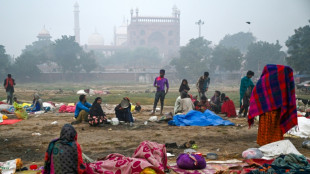
-
 Palestinians turn to local soda in boycott of Israel-linked goods
Palestinians turn to local soda in boycott of Israel-linked goods
-
Typhoon Man-yi bears down on Philippines still reeling from Usagi

-
 UK growth slows in third quarter, dealing blow to Labour government
UK growth slows in third quarter, dealing blow to Labour government
-
Chris Wood hits quickfire double in NZ World Cup qualifying romp

-
 Markets struggle at end of tough week
Markets struggle at end of tough week
-
China tests building Moon base with lunar soil bricks

-
 Film's 'search for Palestine' takes centre stage at Cairo festival
Film's 'search for Palestine' takes centre stage at Cairo festival
-
Oil execs work COP29 as NGOs slam lobbyist presence
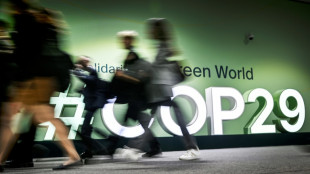
-
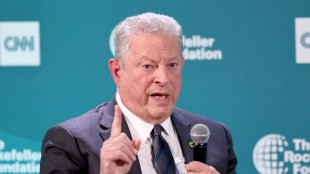 Gore says climate progress 'won't slow much' because of Trump
Gore says climate progress 'won't slow much' because of Trump
-
'Megaquake' warning hits Japan's growth

-
 Stiff business: Berlin startup will freeze your corpse for monthly fee
Stiff business: Berlin startup will freeze your corpse for monthly fee
-
Wars, looming Trump reign set to dominate G20 summit

-
 Xi, Biden attend Asia-Pacific summit, prepare to meet
Xi, Biden attend Asia-Pacific summit, prepare to meet
-
Kyrgios to make competitive return at Brisbane next month after injuries

-
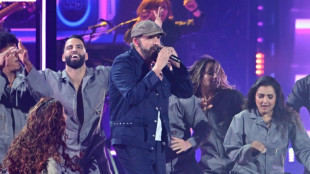 Dominican Juan Luis Guerra triumphs at 25th annual Latin Grammys
Dominican Juan Luis Guerra triumphs at 25th annual Latin Grammys
-
Landslide win for Sri Lanka president's leftist coalition in snap polls

-
 Australian World Cup penalty hero Vine takes mental health break
Australian World Cup penalty hero Vine takes mental health break
-
As Philippines picks up from Usagi, a fresh storm bears down

-
 Tropical Storm Sara pounds Honduras with heavy rain
Tropical Storm Sara pounds Honduras with heavy rain
-
Pepi gives Pochettino win for USA in Jamaica

-
 'Hell to heaven' as China reignite World Cup hopes with late winner
'Hell to heaven' as China reignite World Cup hopes with late winner
-
Rebel attacks keep Indian-run Kashmir on the boil

-
 New Zealand challenge 'immense but fantastic' for France
New Zealand challenge 'immense but fantastic' for France
-
Under pressure England boss Borthwick in Springboks' spotlight

-
 All Blacks plan to nullify 'freakish' Dupont, says Lienert-Brown
All Blacks plan to nullify 'freakish' Dupont, says Lienert-Brown
-
TikTok makes AI driven ad tool available globally

-
 Japan growth slows as new PM readies stimulus
Japan growth slows as new PM readies stimulus
-
China retail sales pick up speed, beat forecasts in October

-
 Asian markets fluctuate at end of tough week
Asian markets fluctuate at end of tough week
-
Gay, trans people voicing -- and sometimes screaming -- Trump concerns

-
 Argentina fall in Paraguay, Brazil held in Venezuela
Argentina fall in Paraguay, Brazil held in Venezuela
-
N. Korean leader orders 'mass production' of attack drones

-
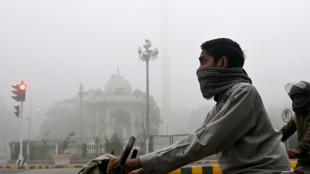 Pakistan's policies hazy as it fights smog
Pakistan's policies hazy as it fights smog
-
Nature pays price for war in Israel's north

-
 New Zealand's prolific Williamson back for England Test series
New Zealand's prolific Williamson back for England Test series
-
Mexico City youth grapple with growing housing crisis

-
 After Trump's victory, US election falsehoods shift left
After Trump's victory, US election falsehoods shift left
-
Cracks deepen in Canada's pro-immigration 'consensus'

-
 Xi inaugurates South America's first Chinese-funded port in Peru
Xi inaugurates South America's first Chinese-funded port in Peru
-
Tyson slaps Paul in final face-off before Netflix bout

-
 England wrap-up T20 series win over West Indies
England wrap-up T20 series win over West Indies
-
Stewards intervene to stop Israel, France football fans clash at Paris match

| CMSC | -0.24% | 24.55 | $ | |
| RIO | -0.31% | 60.43 | $ | |
| NGG | 0.4% | 62.37 | $ | |
| RBGPF | 100% | 61.84 | $ | |
| RYCEF | -4.71% | 6.79 | $ | |
| BP | 1.65% | 29.05 | $ | |
| GSK | -2.09% | 34.39 | $ | |
| AZN | -0.38% | 65.04 | $ | |
| RELX | -0.37% | 45.95 | $ | |
| BTI | 0.2% | 35.49 | $ | |
| SCS | -0.75% | 13.27 | $ | |
| CMSD | -0.02% | 24.725 | $ | |
| VOD | -0.81% | 8.68 | $ | |
| JRI | -0.23% | 13.21 | $ | |
| BCC | -1.57% | 140.35 | $ | |
| BCE | -1.38% | 26.84 | $ |

Nobel prize goes to mRNA Covid vaccine researchers
Katalin Kariko and Drew Weissman won the Nobel Medicine Prize on Monday for work on messenger RNA (mRNA) technology that paved the way for groundbreaking Covid-19 vaccines.
The pair, who had been tipped as favourites, "contributed to the unprecedented rate of vaccine development during one of the greatest threats to human health in modern times," the jury said.
The mRNA vaccines were approved for use in December 2020, and together with other Covid vaccines "have saved millions of lives and prevented severe disease in many more," the jury said.
Kariko, 68, and Weissman, 64, longstanding colleagues at the University of Pennsylvania in the US, have won a slew of awards for their research, including the prestigious Lasker Award in 2021, often seen as a precursor to the Nobel.
In honouring the duo this year, the Nobel committee in Stockholm broke with its usual practice of honouring decades-old research to ensure it stands the test of time.
While the prizewinning research dates back to 2005, the first vaccines to use the mRNA technology were those made by Pfizer/BioNTech and Moderna against Covid-19.
Unlike traditional vaccines which use weakened virus or a key piece of the virus' protein, mRNA vaccines provide the genetic molecules that tell cells what proteins to make, which simulates an infection and trains the immune system for when it encounters the real virus.
The honour is surely sweet for Kariko, who toiled in obscurity for years and struggled to convince her superiors of the need for research on "messenger ribonucleic acid".
Speaking to Swedish Radio, she said her late mother used to listen to the Nobel prize announcements in the hopes of hearing her daughter's name.
"She listened year after year. Unfortunately five years ago she passed at the age of 89. She might be listening from above."
In the 1990s, Kariko believed mRNA held the key to treating diseases where having more of the right kind of protein can help -- like repairing the brain after a stroke.
But the University of Pennsylvania, where Kariko was on track for a professorship, decided to pull the plug after the grant rejections piled up.
- Sweet comeback -
Much of the scientific community was at the time focused on using DNA to deliver gene therapy, but Kariko believed that mRNA was also promising since most diseases are not hereditary and don't need solutions that permanently alter our genetics.
First though, she had to overcome the problem of the massive inflammatory response in animal experiments, as the immune system sensed an invader and rushed to fight it.
Kariko and Weissman discovered that one of the four building blocks of the synthetic mRNA was at fault -- and they could overcome the problem by swapping it out with a modified version.
They published a paper on the breakthrough in 2005.
Then, in 2015, they found a new way to deliver mRNA into mice, using a fatty coating called "lipid nanoparticles" that prevent the mRNA from degrading, and help place it inside the right part of cells.
Both these innovations were key to the Covid-19 vaccines developed by Pfizer/BioNTech and Moderna.
Their mRNA technology is now being used to develop other treatments for diseases and illnesses such as cancer, influenza and heart failure.
The pair will receive their Nobel prize, consisting of a diploma, a gold medal and a $1 million cheque, from King Carl XVI Gustaf at a formal ceremony in Stockholm on December 10, the anniversary of the 1896 death of scientist Alfred Nobel who created the prizes in his last will and testament.
The Nobel will however not be the first gold medal in Kariko's family -- her daughter Susan Francia is a two-time time Olympic gold medalist rower.
D.Kaufman--AMWN

